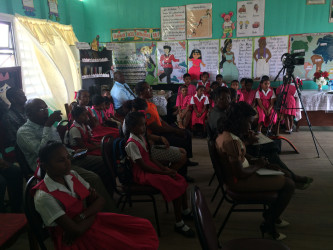Canada is to finance the retrofitting of the Fort Ordnance Primary School to the tune of $15m so that it can serve as an emergency shelter for flood-affected residents.
A release from the Canadian High Commission yesterday said that the Director General of the Civil Defence Commission (CDC), Colonel Chabilal Ramsarup (Ret’ d) and High Commissioner of Canada, Pierre Giroux, visited the Fort Ordnance Primary School on Tuesday afternoon to launch the Canada-funded project.
Canada is providing the CDC with $15,088,500 to retrofit and equip the primary school to be used as an emergency shelter.

Fort Ordnance, East Canje, Berbice, the release said, is home to over seven hundred persons and is frequently affected by flooding from rainfall and high tides. Most of those within the community are self-employed and suffer significant losses in goods they may have stored in their homes during the period of flooding. Children are particularly affected because the school compounds are flooded preventing access into the school.
The release said that with support from the Canada Caribbean Disaster Risk Management Fund (CCDRM), the Fort Ordnance Primary School compound will be raised, the sanitary block expanded to include additional toilets and baths and additional gutters and drains will be installed.

The walkway will be expanded to accommodate vehicles and the bridge leading to the school will be strengthened. Equipment including a refrigerator, microwaves, stoves, sinks and counters will be installed to be used for feeding purposes when the shelter is activated.
The project will also encompass the development of a protocol for the activation and management of the shelter and the training of a management committee.
The CCDRM is part of Canada’s CAD$600 million Caribbean Regional Programme. The Fund is designed to support non-governmental organisations, community groups and government agencies within CARICOM in carrying out small-scale community projects to reduce the risks from the many natural hazards.
In addition to the CDC, Canada, through the CCDRM is also currently supporting the Wowetta Women’s Group and the Kanuku Mountains Community Representa-tive Group to increase the resilience of North and Central Rupununi against droughts. This includes the establishment of two modern cassava processing and farine storage facilities.




